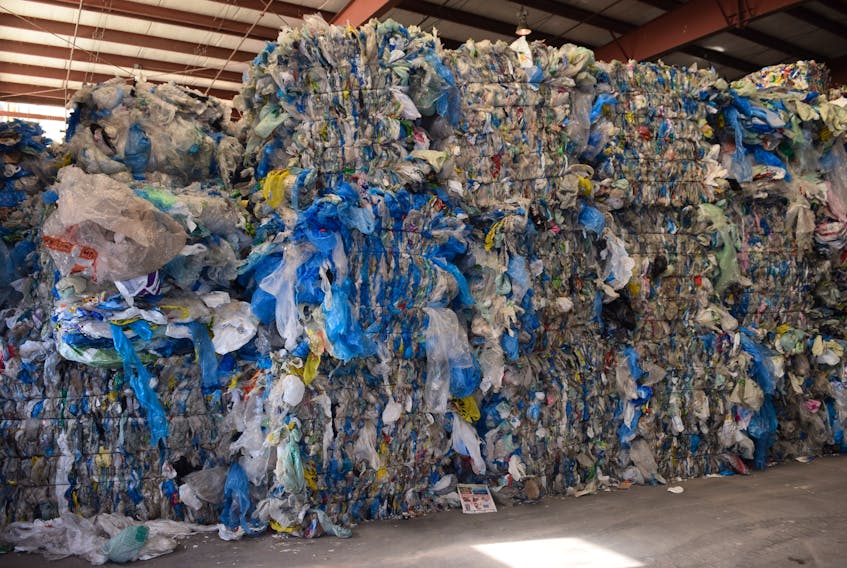It’s time to end our infatuation with plastic, and a national or provincial plastic waste strategy is overdue, says a Dalhousie University professor.
“We have to start weaning ourselves off this material,” Tony Walker, an assistant professor of resource and environmental studies, said of plastic products.
“The production has been exponential since the 1950s and we’ve become reliant on the material. It’s very cheap, it’s very durable, but we have to have alternatives. I don’t know what they are. It is probably multiple alternatives.”
Walker said he and a student who has since graduated did a study on global strategies for bans and levies on plastic grocery bags more than a year ago.
The solution was co-ordinated legislation.
“It tends to be fragmentary, like a council here in Halifax, then there will be some other jurisdiction in another town,” Walker said.
“Either at the national or provincial level, co-ordinated programs would move forward more smoothly. Halifax may be nervous about impacts to small or large businesses, but it’s done already successfully in other parts of the world without interruption of economic viability. Looking to other jurisdictions would be one solution.”
At the end of a lengthy debate Tuesday, Halifax regional council directed Matt Keliher, solid waste manager for the city, and municipal staff to come back to the environment committee with a report on the possibility of eliminating or reducing single-use bags, and to look at extended producer responsibility for plastic grocery bags. Keliher committed to reporting back within a year but the proponent of the motion, Coun. Tony Mancini, had hoped council would move more swiftly toward a plastic bag ban.
“Most of the bans around the world at that time
were focused on the single-use plastic bags — very, very thin stuff you would get from Sobeys or the Superstore,” Walker said of his research last year.
“I think producers and manufacturers also need to take responsibility. One thing that we’ve alluded to in our summary article is extended producer responsibility. This material becomes a waste product for you and I as consumers, then the producer of this material should take responsibility and take it back, whether it’s through deposit schemes or they actually pay for some infrastructure in their facilities whereby they can take it back. That assumes that you are not shipping it halfway across the world, you are probably sending it back to a local producer. So the ecological footprint in theory should be lower.”
The problem in Halfiax came to the fore when China, which had been importing about half the world’s recycled plastics, decided to stop taking film plastics, including shopping bags and packaging plastic.
“To further complicate matters, China has now stopped accepting imports of people’s recycled waste,” Walker said. “We thought that was our solution but now there is no longer a market for our waste products so we are having to send it to landfill, and not even here in Nova Scotia.”
Walker said some of the plastic shipped to China was contaminated.
“They were probably burning it or having to landfill it as well, so it was kind of a worthless material even for those guys to handle, so they put a stop to it. It was not a very sustainable plan, an ecological footprint that is not something that we should really tolerate.”
Walker, who has had a recent article on plastic waste published in the science journal Nature, and who will join his former student in making a presentation at an upcoming marine debris conference in San Diego, said consumer pressure can influence the use of plastics.
“There is a lot of that happening now in Europeand the European Union now has a strategy for banning plastics pretty much across the board. The other game-changer and the other solution is alternatives. Fifty years ago my mom (in Great Britain) used to go shopping and she came back with a trolley and there was no plastic on the food items at all. It was all very basic stuff. We need alternatives, whether we are looking for new technology or we go retro to use some products that our parents’ generation used.”
Walker said Canada should follow the world precedent that Germany and Denmark set nearly 25 years ago.
“Denmark and Germany were one of the first ones to ban plastic bags. They were way ahead of the curve. In terms of what they do with it, there is probably regasification, high-temperature conversion. I think Sweden actually burns garbage for energy in a closed system. What in North America would be considered waste and sent to landfill if you’re lucky, in Europe is being used as an energy. With the right technology and high-temperature combustion, it can have very limited or negligible emissions. You can actually gain a useful product from it. They are also looking for alternatives. I don’t think you can get a plastic bag in Europe now without paying a deposit fee, or it’s banned outright.”








